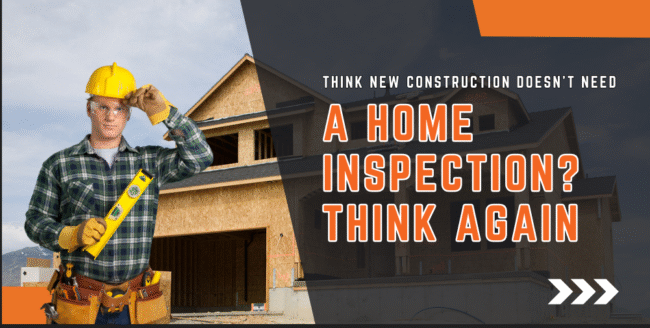
Does buying new mean skipping the inspection? A newly built home can have problems. Sometimes, overlooked issues like poor grading, rushed finishes, or incomplete systems can be present in brand-new properties. Builders work fast to meet deadlines, and in the process, they sometimes cut corners.
Moreover, a new construction inspection lets you catch those hidden problems before they become expensive. It’s one smart step that protects your investment and brings peace of mind—keep reading to see why it matters.
New Homes Can Have Problems Too
Buying a newly constructed home might seem safe, but unseen problems can still exist. Even though everything looks brand new, hidden flaws or overlooked essential code requirements might cause future issues. These are the common reasons defects occur in new constructions:
A. Construction Shortcuts
- They may rush to meet deadlines, resulting in incomplete work or poorly installed systems.
- Some finishes or structural components might not meet long-term quality standards.
B. Hidden Construction Defects
- Foundation cracks, faulty wiring, or plumbing leaks may not appear during a basic walkthrough.
- These defects can lead to unexpected repairs soon after move-in.
C. Missed Code Requirements
- Certain elements may pass local inspections but fall short of best practices or efficiency standards.
- It also includes HVAC setups, insulation quality, and ventilation requirements.
Since these problems are not typically visible, a home inspection is necessary. It helps in the following ways:
- A professional home inspection provides an independent evaluation of the property’s condition.
- It lets you catch problems early and address them before closing the deal.
Even new homes need careful evaluation. Therefore, a proper inspection ensures your investment starts on solid ground.
What Happens During a New Construction Inspection
Although everything in a new home may appear flawless, deeper issues can go unnoticed without a proper evaluation. Unlike a basic builder walkthrough, a professional new construction inspection focuses on function, safety, and code compliance. Inspectors check the following key components:
A. Structure
- Inspectors evaluate the foundation, framing, and roof to confirm stability and proper construction.
- They look for any signs of settling, cracks, or misaligned components.
B. Electrical Systems
- They test outlets, breakers, and light fixtures to ensure safe and correct installation.
- Inspectors also review proper wiring, grounding, and circuit labeling.
C. Plumbing
- They check all pipes, fixtures, and drains for leaks or installation flaws.
- Inspectors verify correct water pressure and drainage.
D. HVAC
- They test heating and cooling units for performance.
- Inspectors examine ductwork for proper layout and airflow.
A thorough inspection before closing allows time for corrections and ensures the home meets safety standards.
Builder Inspection Tips for New Homes
New construction should still undergo a careful review before closing. Even with new materials and recent work, oversights can occur. The following builder inspection tips help prepare for the inspection:
- Review blueprints and specifications: Verify the construction to ensure it aligns with the original plans.
- Check permits and approvals: Confirm that all necessary permits are complete and properly closed out.
- Document findings: Share notes and photos of incomplete or incorrect work with the builder.
Being on-site during the inspection helps you fully understand the condition of your new home. These are the reasons why your involvement is essential:
- Observe the inspection firsthand to see any issues as they arise.
- Ask questions about concerns to clarify potential problems or repairs needed.
- Gain insight into maintenance and warranty details directly from the inspector or builder.
- Ensure transparency and accountability by being engaged throughout the process.
- Make informed decisions about accepting the home or requesting corrections before closing.
Common Issues Found in New Construction
Newly built homes may appear problem-free, but often contain defects requiring attention. A home inspection frequently uncovers the following issues:
- Leaks: Improperly sealed roofs, windows, or plumbing connections can allow water intrusion.
- Poor insulation: Missing or uneven insulation reduces energy efficiency and leads to inconsistent indoor temperatures.
- Unfinished or misaligned work: Incomplete trim, loose outlets, or uneven fixtures may result from rushed construction.
- HVAC or ventilation problems: Blocked or disconnected ductwork can affect airflow and comfort.
- Grading and drainage concerns: Improper slope near the house can result in water gathering by the foundation.
A professional home inspection helps uncover these concerns early, allowing you to request corrections before moving in or finalizing the purchase.
How to Choose the Right Home Inspector for New Construction
Selecting the right inspector is key to identifying issues before they become costly. The following tips can help you make an informed choice:
● Verify Qualifications
- Confirm that the inspector holds certifications from reputable organizations like ASHI or InterNACHI.
- Choose one with direct experience in new construction projects.
● Check References and Reviews
- Ask for references from recent clients who had new homes inspected.
- Review online feedback to assess reliability and thoroughness.
Moreover, avoid relying solely on builder-provided inspectors. Independent evaluations help ensure honest assessments without conflicts of interest. An experienced, unbiased inspector provides peace of mind by offering a complete and accurate picture of your home’s condition.
Cover What Builders Might Miss!
New construction doesn’t guarantee a flawless home. Regardless of the builder’s reputation or the home’s age, a professional home inspection is a smart move. By following simple builder inspection tips and taking a proactive approach, you can catch hidden problems early and avoid expensive repairs.
Conclusively, a thorough new construction inspection gives you peace of mind and helps you move in confidently. To protect your investment from the start, schedule a trusted home inspection for new homes in New Jersey, PA, today.
